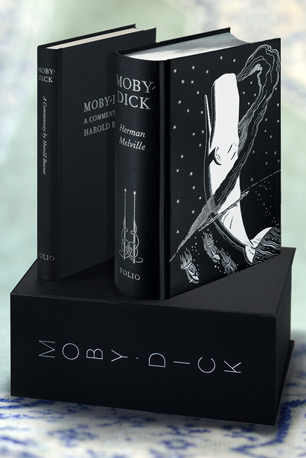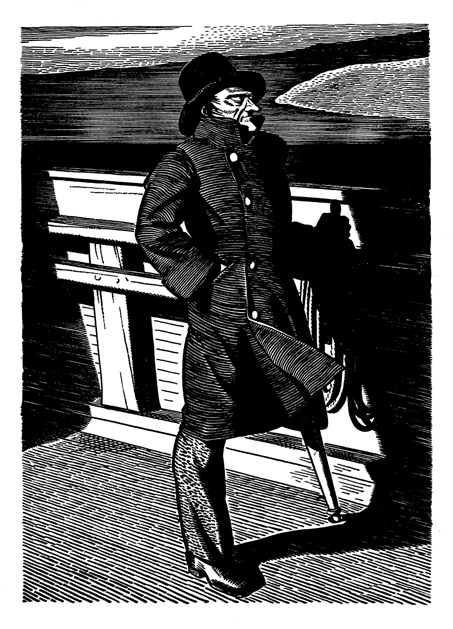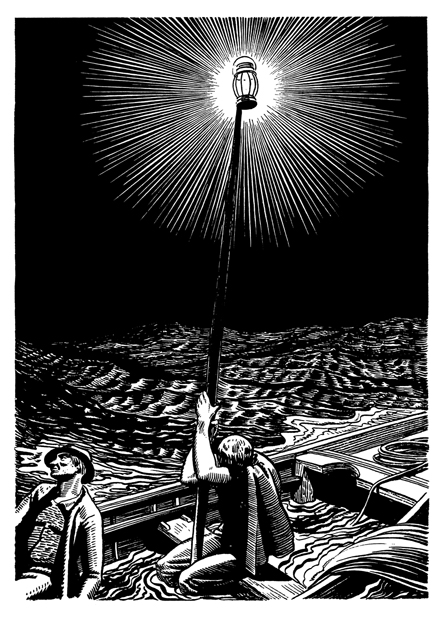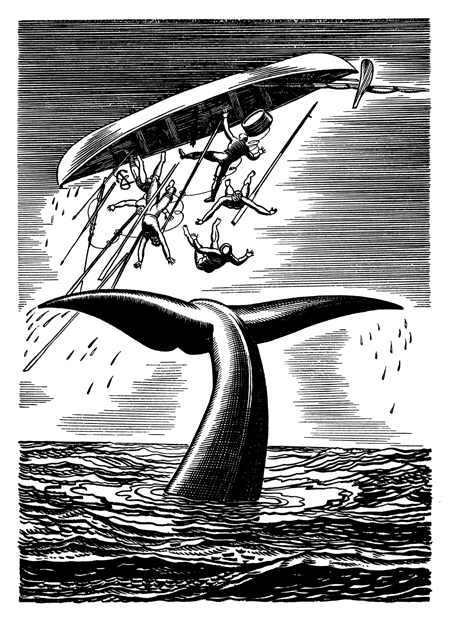Limited Edition, 1,750 copies printed.
‘I think that the book which I put down with the unqualified thought “I wish I had written that” is Moby Dick’
WILLIAM FAULKNER
The monumental epic of American literature
Herman Melville’s tale of the hunt for the white whale, Moby Dick, is one of the greatest novels of all time. It is at once an adventure story of the high seas, and an exploration of the uncharted regions of the soul. Neglected in Melville’s day, Moby-Dick is now acknowledged as a sublime work of the imagination, an American Odyssey.
‘Call me Ishmael’ is one of the most famous opening sentences ever written. Moby-Dick’s narrator Ishmael is a drifter and former merchant seaman, who departs Nantucket on a perilous whaling mission to the South Seas. With him on the Pequod are the cannibal Queequeg and ‘a heathen crew … whelped somewhere by the sharkish sea’. At the helm is Captain Ahab, whose soul is bent on hunting and killing the great white whale that cost him his leg in an earlier encounter. As they voyage south, Ahab’s obsession takes his crew deeper into the abyss in desperate pursuit of ‘the gliding great demon of the seas of life’.
‘Melville’s lyricism, so redolent of Shakespeare’s, thrives on the four elements. He blends Scripture and the sea, the music of the waves and the heavenly bodies, the poetry of the everyday and a grandeur of Atlantic proportions.’
ALBERT CAMUS
In Ahab, Melville creates a tragic hero on the scale of King Lear or Don Quixote. His single-minded pursuit of the whale is both terrifying and awe-inspiring, as he perverts his commercial venture into one of vengeance on a seemingly invincible foe. The crew of the Pequod, drawn from all corners of the globe, are the human casualties of Ahab’s quest: battling the elements and driven onwards by a madman.
With its elemental simplicity of plot, its pathos and monumental action scenes, Moby-Dick is a breathtaking adventure. But its scope is so much greater than that. It is a vivid meditation on Melville’s America, taking in the wider themes of nature, religion, society, war, history and civilisation. Moby-Dick is rich in symbols, from the biblical names of the characters to the great whale itself: part monster, part benign natural force and source of the oil that powers civilisation. Perhaps most wonderful is the poetry of Melville’s language. From the ‘stately dramatic thee and thou of the Quaker idiom’ spoken by Ahab to the colourful jargon of the lower decks, he commands an astonishing range of registers. His words echo the humour of Dickens, the richness of Shakespeare and the cadences of the Bible, combined in an exhilarating style that is all Melville’s own.
Moby-Dick was published in 1851 to a mixed critical reception. Reviewers praised Melville’s almost unparalleled power over the capabilities of language, but many baulked at the book’s unconventionality. Only in the 20th century did Moby-Dick take its rightful place as America’s greatest epic. In his book Call me Ishmael, the critic Charles Olson wrote, ‘From passive places his imagination sprung a harpoon … It gave him the power to find the lost past of America, the unfound present, and make a myth, Moby-Dick, for a people of Ishmaels.’ Now, this great American novel is published in our series of limited editions celebrating masterpieces of world literature.
‘A book for life … vast and enticing, and never seems the same twice.’
JOHN NAUGHTIE
‘In that wild, beautiful romance, Melville seems to have spoken the very secret of the Sea.’
JOHN MASEFIELD
HERMAN MELVILLE (1819‒1891)
Herman Melville was born in New York City to wealthy parents of New English and Dutch origin. When his father died a bankrupt, Melville left school, aged 12, to work as a bank clerk. He attended night school and became a teacher before signing on as a merchant seaman. In 1841, he boarded the whaling ship Acushnet. After a year and a half, Melville jumped ship and spent a month among a tribe in the Marquesas Islands, before making his way home via Hawaii and Peru. In New York, he married and published several novels, to instant success. His meeting with Nathaniel Hawthorne in 1850, while he was writing Moby-Dick, was a pivotal moment and filled him with inspiration. Moby-Dick’s reception was mixed, and his following novel Pierre was a failure. Melville’s reputation faded, and his later years were shadowed by his son’s suicide and his own ill-health. He worked as an inspector in the New York Customs House for nearly 20 years until his death in 1891.
THE CELEBRATED ILLUSTRATIONS BY ROCKWELL KENT
Moby-Dick presents a myriad of possibilities to the illustrator, thanks to Melville’s vivid powers of description, yet to match the scale and scope of the book is a daunting task. Rockwell Kent (1882‒1971) was an engraver, lithographer, illustrator and author, who shared Melville’s visionary outlook. His celebrated illustrations from the 1930 edition are reproduced in this Folio Society limited edition. With their beauty, simplicity and power, they will forever be associated with Melville’s epic.





